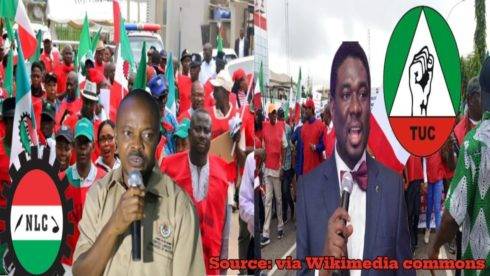Nigeria is bracing for widespread disruptions as organized labour unions across the country have launched nationwide protests against the Federal Government’s controversial policies in the power sector. The protests, spearheaded by the Nigeria Labour Congress (NLC) and the Trade Union Congress (TUC), are in response to the government’s decision to increase electricity tariffs and eliminate subsidies, a move that labour leaders argue will further impoverish Nigerian citizens.
The protests have already begun in several states, with workers and citizens taking to the streets to voice their dissent. Major cities like Lagos, Abuja, and Kano have witnessed large gatherings of protesters carrying placards and chanting slogans against the government’s policies. The labour unions have vowed to sustain the demonstrations until the government reverses its decision, setting the stage for a prolonged standoff.
Organized Labour: Protesters Target NERC Offices and Power Distribution Companies
One of the primary targets of the protests is the Abuja office of the Nigeria Electricity Regulatory Commission (NERC), the regulatory body responsible for overseeing the power sector. Protesters have converged on the NERC headquarters, demanding immediate action from the commission to address their concerns and protect the interests of Nigerian citizens.
Additionally, regional branches of power distribution companies across the country are facing disruptions as protesters occupy their premises. The move aims to cripple the operations of these entities and draw attention to the plight of citizens grappling with high electricity costs and unreliable power supply. Protests have been reported at the offices of major distribution companies, including Ikeja Electric, Eko Disco, and Kaduna Electric.
Organized Labour: Economic Activities and Daily Life Disrupted
The nationwide protests are already having far-reaching consequences on economic activities and daily life in Nigeria. Businesses, schools, and transportation systems have been disrupted as protesters take to the streets in major cities and urban centers. Many businesses have been forced to temporarily close their doors, while schools have suspended classes to ensure the safety of students and staff.
While the right to peaceful protest is enshrined in the Nigerian constitution, there are growing concerns about the potential for violence and clashes between protesters and security forces. Authorities have called for restraint from all parties involved and urged the protesters to remain calm and lawful in their demonstrations. However, reports of minor clashes and confrontations have already emerged from some protest sites.
Organized Labour: Government Acknowledges Concerns, Seeks Dialogue
The Federal Government has acknowledged the concerns raised by organized labour regarding the power sector policies. Officials have expressed willingness to engage in dialogue and negotiations to find a mutually acceptable solution to the crisis. The Minister of Labour and Employment, Dr. Chris Ngige, has reached out to the labour unions, inviting them to the negotiating table to discuss their grievances.
However, the government has also warned against any actions that could undermine public order and safety. Security agencies have been put on high alert to maintain law and order during the protests. It remains to be seen whether the protests will prompt the government to reconsider its position or if a compromise can be reached through negotiations with the labour unions.
Organized Labour: Public Sentiment and Call for Accountability
The planned protests have garnered widespread public support, with many Nigerians expressing frustration over the high cost of electricity and the perceived lack of transparency in the power sector’s operations. Citizens have taken to social media platforms to voice their concerns and call for greater accountability from the government and power distribution companies.
Hashtags such as #PowerSectorReforms and #EndElectricityTariffHike have been trending on Twitter, with users sharing their experiences and expressing solidarity with the labour unions’ efforts. Regardless of differing opinions, the issue has highlighted the need for comprehensive reforms in the power sector to address the concerns of Nigerian citizens and provide reliable and affordable electricity supply.
Table of Contents
Discover more from OGM News NG
Subscribe to get the latest posts sent to your email.














